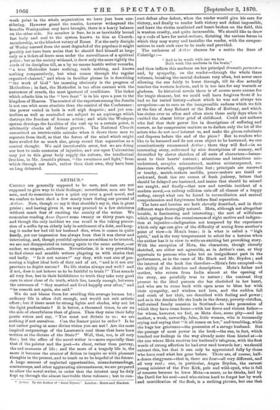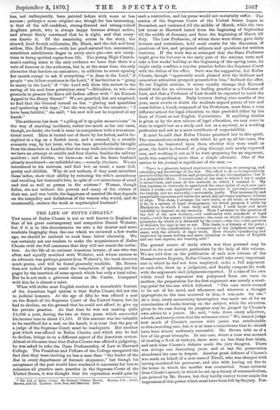ARTHUR.* 'CRITICS are generally supposed to be men, and men
are not -supposed to give way to their feelings ; nevertheless, men are but men, and do sometimes have a quiet cry over a good novel, and
we confess to have shed a few manly tears during our perusal of Arthur. Now, though we say it that shouldn't say it, this is great praise ; and having given it, we may proceed to a few strictures -without much fear of exciting the enmity of the writer. We -remember reading Anne Dysart some twenty or thirty years ago, -and though the only incident we can recall is the taking posses. sion of a coffin by an elderly lady in settlement of a debt, and keep- ing it under her bed till her husband dies, when it comes in quite handy, yet our impression has always been that it was clever and interesting, and, though youthful opinions are seldom to be trusted, we are not disappointed in turning again to the same author,—or 'rather, we suspect, authoress. Nevertheless, it is very provoking 'to find clever and sensible writers plaguing us with stories that -end badly. " Is it not nature?" say they, with vast airs of pos- sessing a higher ideal both of duty and of art, "and is it not our province to depict nature? Do life stories always end well? and if not, does it not behove us to be faithful to truth ?" That sounds all very fine, but in their faithfulness to truth they take very good care to steer clear of the truth, which lies, tamely enough, between the extremes of "they married and lived happily ever after," and he cometh not again, she said."
We do not blame them for avoiding this average human lot ; -ordinary life is often dull enough, and would not suit artistic -effort ; but if there must be strong lights and shades, why not let the light predominate ? It is better, a thousand times, to err on 'the side of cheerfulness than of gloom. Then they raise their lofty ,poetic voices and say, "You must not dictate to us ; we are nothing if not ourselves. Can the limner paint to order ? Is he not rather gazing at some divine vision you see not ? Are the most inspired outpourings of the Laureate's soul those that have been written at the dictate of the State?" Well, that, too, is all very fine ; but the office of the novel-writer is—more especially than that of the painter and the poet—to cheer, rather than portray, the sad moments of life ; and the more of a tragedy life is, the snore it becomes the creator of fiction to inspire us with pleasant thoughts in the present, and to teach us to be hopeful of the future. A large amount of neglected opportunities, misunderstandings, contretemps, and other aggravating circumstances, we are prepared to allow the novel-writer, in order that the interest may be duly kept up through the almost inevitable three volumes ; but to con-
Arthur. By the Author of " Anne Dysart." London : Hurst and Blackett.
cod defeat after defeat, when the reader would give his ears for victory, and finally to render both victory and defeat impossible, and leave the victim mutilated and heart-broken on the field, this is wanton cruelty, and quite inexcusable. We should like to draw up a code of laws for novel-writers, dictating the various forms in which they may worry and tantalize the reader, with the compen- sations in each such case to be made and provided.
The authoress of Arthur chooses for a motto the lines of Coleridge :— " And to be wroth with one we love Doth work like madness in the brain," and then inflicts this madness on her principal dramatis personre- and, by sympathy, on the reader—through the whole three volumes, breaking the mental darkness very often, but never once allowing the sun fairly to burst through, till its disc actually touches the western horizon, and it is too late for any warmth or gladness. In historical novels there is of course more exouse for the tragic element, but we could well have forgiven Scott if he had so far varied history—about which he was not always too scrupulous—as to save us the inexpressible sadness which we felt at the fate of Amy Robsart or the Duke of Rothsay, and which has stolen over us often and often since those early days when it excited the almost bitter grief of childhood. Could not authors who feel that their power lies in descriptions of suffering and sorrow, so far compromise matters as to darken only the lot of the actors who do not most interest us, and make the gloom culminate and disperse before the end of the piece ? But to readers who like to be harassed and do not even object to be harrowed, we can conscientiously recommend Arthur ; there they will find—in an interesting story, enlivened by nice descriptions of scenery, and diversified by clever sketches of all sorts of characters—harass- ment to their hearts' content ; attentions and intentions mis- understood, scruples miscontrued, motives misinterpreted, en- deavours thwarted, opportunities lost ; principals are reserved or touchy, match-makers meddle, peace-makers are timid or awkward, fresh ties are causes of fresh jealousy, letters that should be delayed are hastened, and trains that should be missed are caught, and finally—that new and terrible incident of a modern novel,—a railway collision cuts off all chance of a happy ending, except what can be found in reconciliation and mutual comprehension and forgiveness before final separation.
The hero and heroine are both cleverly described, and in their
different ways thoroughly natural. Meta, although not altogether lovable, is fascinating and interesting ; the sort of wilfulness which springs from the consciousness of right motive and indigna- tion at injustice—indignation not tempered by the experience which only age can give of the difficulty of seeing from another's point of view—is Meta's bane ; it is what is called a "high spirit," and is the very temperament to select for a heroine when the author has it in view to write an exciting but provoking story. With the exception of Meta, the characters, though cleverly sketched, are either not agreeable, as in Arthur's case, or they appertain to persons who take but an insignificant part in the performance, as in the cases of Mr. Black and Mr. Brydon ; and the interest of the book lies therefore—Meta's fate excepted—in the ability of its sketches and descriptions. Meta's father and mother, who return from India almost at the opening of the story, are painfully true to nature ; the contrast they present to the ideal parents she has cherished in her heart, and who are to come back with open arms to bless her with their sympathy, and wisdom and love, and the sudden fall and crash of her idols, are described with feeling and power ; and so is the desolate life she leads in the dreary, poverty-stricken, half-ruined family mansion in Scotland—to take possession of which they have come home—with her fierce and violent father— for whom, however, we feel, as Meta does, some pity—and her mother, a weak, cowardly, false, little woman, who is incessantly crying and saying that "it all comes on her," and trembling, while she hugs her grievance—the possession of a savage husband. But the passage of most power in the book—the one, in fact, which touched our feelings in the way already more than hinted at—is the one where Meta receives her husband's telegram, with the first words of strong affection he had ever used towards her ; we should extract this, but that it can only be appreciated fully by those who have read what has gone before. There are, of course, half- a-dozen clergymen—that is, there are four—all very different, and all very real ; one, in particular, Angus Brydon, the earnest young minister of the Free Kirk, pale and wild-eyed, who is full of remorse because he loves Meta—a snare, as be thinks, laid by the Devil for his soul—and who strives hard to forget her by work and mortification of the flesh, is a striking picture, but one that has, not unfrequently, been painted before with more or less success ; perhaps a more original one, though far lees interesting, is that of the self-confident, strong-framed and strong-voiced Anglican priest, who is always happy because always active, and always firmly convinced that he is right, and that every- one knows it. Of the remaining actors in the story, the shrewd, kind Scotch millionaire, Mr. Black, and the rich and busy widow, Mrs. Bell Fraser—with her good-natured but, necessarily, sometimes mischievous finger in every one's pie—are not excep- tions in being spirited copies from life. The young High-Church- man's canting sister is the only evidence we have that there is a vein of humour in the authoress, but is, at the same time, the only -character that borders on caricature ; in addition to never opening her mouth except to ask if everything " is done to the Lord," if people " are fellow-creatures in the Lord," if her brother is " going to marry in the Lord," if " the Lord will bless this sorrow to the saving of his soul from pernicious error"—Ritualism, to wit—she proceeds to present the fierce old Indian officer with " An Earnest Appeal to the Hoary Sinner?" We are gratified, but not surprised, -to find that the General turned on her, "glaring and speechless and sputtering with rage ;" but she was equal to the occasion ; " I have been faithful," she said ; " his soul will not be required at my hands."
The authoress has been " a piling of it up quite mountainous" in the way of startling incidents, rather too much so for our taste, -though, no doubt, the book is tame in comparison with a true sensa- tional novel. Meta is turned out of doors by her father, and is be- nighted in a fog on a Scotch moor, and is rescued, in a sweetly romantic way, by her lover, who has been providentially brought from his chambers in London that she may walk into his arms ; then we have an attempt at suicide and four deaths, besides the railway -accident ; and further, we have—as well as the fierce husband -already mentioned—an unfaithful one,—namely, the hero. We are introduced to his mistress, and find her, as usual, a mere doll, pretty and childish. Why do not authors, if they must introduce these ladies, show their ability by restoring the wife's ascendancy and recalling her husband's love, in spite of real attractions of mind and soul as well as person in the mistress ? Women, though fallen, are not without the powers and many of the virtues of their sex, and woe betide the happiness of married life that depends on the insipidity and dollishness of the women who would, and do -occasionally, enslave the weak or unprincipled husband !































 Previous page
Previous page